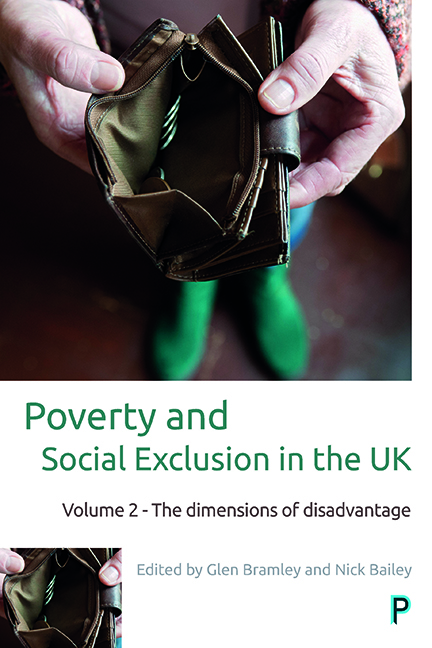eleven - Financial inclusion, financial stress and debt
Published online by Cambridge University Press: 12 April 2022
Summary
Introduction
This chapter discusses the concepts of debt and financial exclusion, and considers the significance of the findings of the PSE-UK survey in the light of policy and social developments in this area in the UK over the past decade. At the time, the Millennium (PSE) Survey in 1999 was one of the first to look the relationships between poverty, debt and financial exclusion (McKay and Collard, 2006). Since then, there has been increasing interest in the way debt problems and financial exclusion may contribute to a range of economic, social and health outcomes, as well as interest in the multidirectional causal linkages between financial exclusion and debt (Salignac, Muir and Wong, 2016; Simpson and Buckland, 2009; Sinclair, 2013).
Financial exclusion research originated in the context of the UK's early-1990s financial crisis, at a time when banks became increasingly restrictive in their service delivery, withdrawing from vulnerable social groups and disadvantaged localities in order to reduce risk (Fuller, 1998; Leyshon and Thrift, 1995). The term ‘financial exclusion’ emerged as a general concept to describe the process by which social groups and individuals were excluded from access to financial services, including loans and bank accounts (Leyshon and Thrift, 1995). Over the course of the 1990s, technological developments in electronic banking meant that the importance of banks’ geographical locations diminished relative to a much broader range of barriers preventing certain social groups from accessing appropriate and affordable financial products and services (Mitton, 2008). Over this period, research has similarly broadened from a narrow focus on the consequences of exclusionary criteria and costs associated with specific financial products or services (Devlin, 2005), to include a much wider range of causal processes associated with non-use. These include problems relating to a lack of financial capability, defined as the knowledge, skills and ability to identify appropriate financial products and services and to effectively manage finances (Taylor, 2011). In many countries, such problems are found to be concentrated among poorer and more disadvantaged populations (Hogarth et al, 2005; Carbo et al, 2007). Financial exclusion also needs to be understood in terms of a wider societal shift towards ‘financialisation’ (Sinclair, 2013; Marron, 2013), whereby financial institutions, markets and services become more embedded in different aspects of social, institutional as well as economic life.
- Type
- Chapter
- Information
- Poverty and Social Exclusion in the UK Vol 2The dimensions of disadvantage, pp. 267 - 288Publisher: Bristol University PressPrint publication year: 2017

